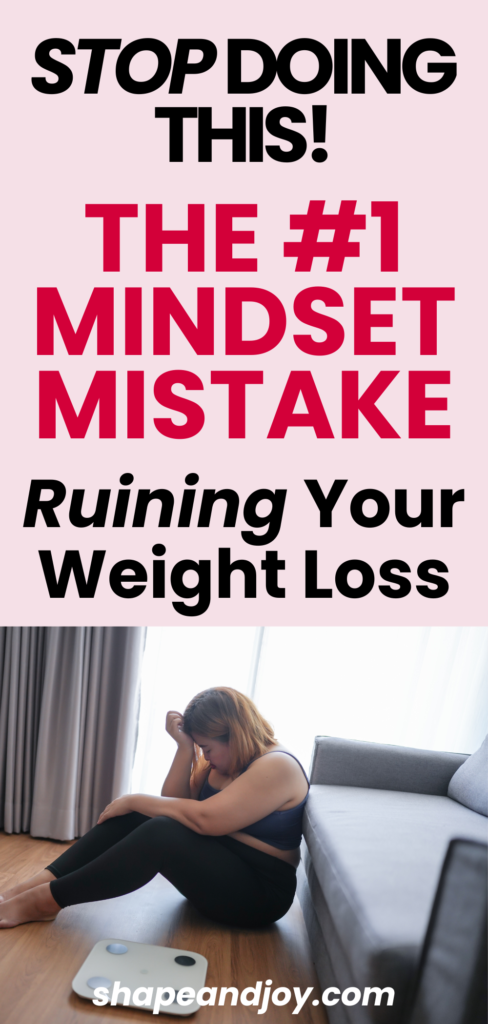This post may contain affiliate links, which means that I may earn a commission if you click on the link or make a purchase using the link. When you make a purchase, the price you pay will be the same whether you use the affiliate link or go directly to the vendor’s website using a non-affiliate link.

Ever feel like you’re either smashing your weight loss goals or completely off the rails? One day, you’re meal-prepping, hitting the gym, and feeling unstoppable—next minute, you’ve had one biscuit, decided you’ve “ruined” everything, and now you’re deep into a “might as well start again Monday” binge.
Sound familiar?
That, my friend, is all-or-nothing thinking—and it’s the reason you keep getting stuck.
When you see your weight loss journey as perfect or pointless, every tiny slip-up feels like a disaster. And guess what? That kind of thinking is wrecking your progress.
But here’s the good news: you don’t have to be perfect to succeed. In this post, we’re going to ditch the extremes, embrace flexibility, and find a balanced approach that actually works long term.
Let’s do this!
The Problem with All-or-Nothing Thinking
At first, it feels great. You’re all in, smashing workouts, meal prepping like a pro, and feeling unstoppable. But then… life happens. You miss a workout. You have a slice of cake. You don’t hit your water goal for the day.
And suddenly, that little voice in your head pipes up: “Welp, I’ve ruined it now. Might as well eat everything in sight and start again on Monday!”
Newsflash: That’s NOT how progress works.
When you think this way, every minor slip-up feels like a catastrophe. Instead of brushing it off and carrying on, you spiral into guilt, frustration, and a “sod it” mentality. This is how people get stuck in the cycle of start-quit-start-quit. And let’s be real—how’s that working out for you?

Recognising All-or-Nothing Thinking
Spotting this mindset is the first step to ditching it for good. Have you ever caught yourself thinking:
“I ate one ‘bad’ food today, so the whole day is ruined.”
“I missed a workout, so I may as well skip the whole week.”
“I was doing so well, but now I’ve fallen off the wagon—again.”
If any of these sound like you, it’s time to bin that black-and-white thinking and find some middle ground.
Why Balance Beats Perfection
Look, perfection isn’t the goal. Sustainability is. When you let go of the idea that you have to be perfect to succeed, you free yourself from the pressure and actually start seeing results.

1. Moderation is the Key to Sanity
Extreme dieting = unsustainable and miserable.
Balanced eating = sustainable and enjoyable.
You don’t have to eat like a rabbit to lose weight. You can—and should—have treats without guilt. When you allow yourself flexibility, you’re less likely to swing between restriction and bingeing.
Action Step: Stop labelling foods as good or bad. One burger won’t make you gain weight, just like one salad won’t make you lose it. It’s the overall pattern that matters.
📌 Pin this for later! ⬇

2. Sustainable Exercise Routines Work Best
Exercise shouldn’t be a punishment for what you ate—it should be something you actually enjoy. If you’re forcing yourself into daily HIIT workouts you hate, it’s no wonder you keep falling off the wagon.
Action Step: Find a workout routine that you actually like (or at least don’t dread). Walking, dancing, lifting weights, yoga—whatever floats your boat. The best workout is the one you’ll stick with.
3. Consistency Over Perfection
A missed workout or an extra slice of cake doesn’t “ruin” anything. It’s what you do most of the time that counts. Progress isn’t about being perfect—it’s about showing up even when things aren’t ideal.
Action Step: Next time you “mess up,” don’t hit the self-destruct button. Just get back on track at the next meal or the next day. No guilt. No punishment. Just move on.

How to Break Free from All-or-Nothing Thinking
Set Realistic Goals – Forget the “I must lose 10lbs in a week” nonsense. Set small, achievable targets that actually fit your lifestyle.
Allow Flexibility – If you want cake, have the cake! Just don’t let one treat turn into a week-long binge.
Reframe Your Thoughts – Instead of “I failed,” try “I had a treat, and that’s fine. Back on track now.”
Celebrate Small Wins – Drank more water today? Got in a short walk? That’s progress. Own it.
Make Food & Exercise About Self-Care, Not Punishment – Workouts should make you feel strong, not drained. Food should fuel you, not make you feel guilty.
Mindset Hacks for Weight Loss Success: Must-Read Posts
Struggling with motivation? Stuck in self-doubt? These posts will rewire your mindset, boost confidence, and keep you on track!
- Lost Your Mojo? 3 Motivation Killers Sabotaging Your Weight Loss
- Are You Stuck in All-or-Nothing Thinking? Here’s Why It’s Sabotaging Your Weight Loss
- Why Your Weight Loss Motivation Keeps Running Out—And How to Fix It
- How Positive Affirmations Can Transform Your Weight Loss Journey
- Mindset Matters: Change How You Think To Lose Weight
- 5 Types of Mentality: A New Approach To Healthy Habit Changes
- Achieve Breakthrough Results with the Be, Do, Have Mindset
- When Goals Backfire: Consequences of Unrealistic Expectations
- Growth Mindset: Why It’s Essential for Self-Motivation and Personal Improvement
- 30 Inspiring Quotes For Your 2025 Fitness Vision Board
- The Ultimate Mindset Shift Toolkit: 15 Products to Rewire Your Brain for Success
Final Thoughts: Ditch the Extremes, Find the Middle Ground
If you’ve been stuck in the all-or-nothing trap, here’s your wake-up call: perfection isn’t required. Your journey is unique, and the best approach is the one that actually works for you.
- Small, consistent efforts > Extreme, short-lived attempts.
- A single treat won’t derail your progress—giving up will.
- Every step forward counts, even the small ones.
Now tell me—have you been guilty of all-or-nothing thinking? What’s helped you break free from it? Drop a comment below, and let’s chat!
📌 Pin this for later! ⬇
